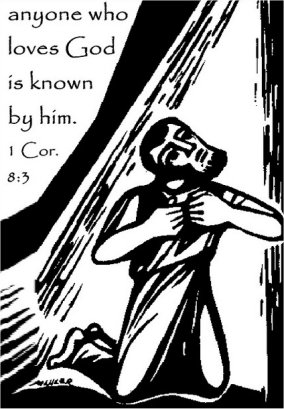
 E THINK WE KNOW PEOPLE. All of us do. Maybe it’s a spouse or a roommate or a best friend. We think we know them because we know their handwriting; we know their pet words & phrases; we can predict the play-by-play of their morning routine; we can identify a sweater as theirs just by the smell; we can recognize their footsteps coming down the staircase.
E THINK WE KNOW PEOPLE. All of us do. Maybe it’s a spouse or a roommate or a best friend. We think we know them because we know their handwriting; we know their pet words & phrases; we can predict the play-by-play of their morning routine; we can identify a sweater as theirs just by the smell; we can recognize their footsteps coming down the staircase.
Every single one of us has a few people in our lives that we know that well. But even all that, I daresay, is shallow by comparison to the way we are known by God.
The thirteenth chapter of the First Letter to the Corinthians is home to the famous passage that begins, “Love is patient, love is kind.” After all the talk about love, St. Paul goes into a comparison between life on Earth and life in heaven. He says: “At present I know partially; then I shall know fully, as I am fully known” (1 Corinthians 13:12).
So many people wander through life longing to feel like somebody truly knows and understands them, with all their intricacies and subtleties. To be “fully known” by God must be an extraordinary sensation! The good news is that we don’t have to wait to get to heaven to experience it. God has known us fully since the moment He created us. As He says to the Prophet Jeremiah: “Before I formed you in the womb, I knew you; before you were born, I dedicated you” (Jeremiah 1:5).
Is it possible to reach a very deep level of intimacy with a human person? Absolutely. But no human relationship can measure up to the incomparable intimacy we have with God, Who knows us better than we know ourselves.
